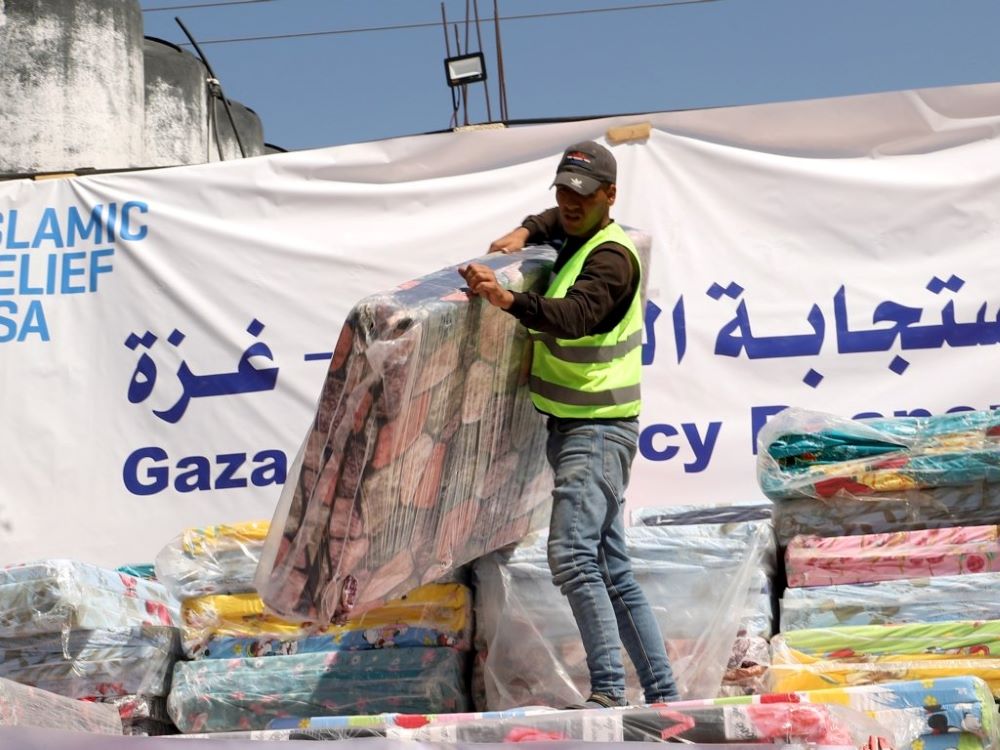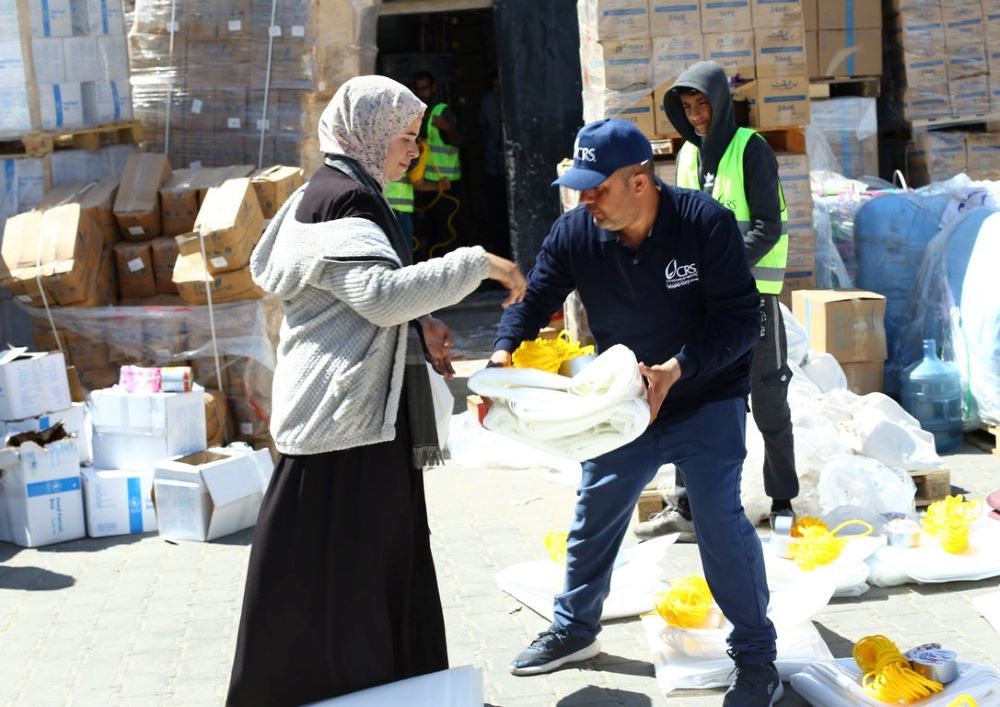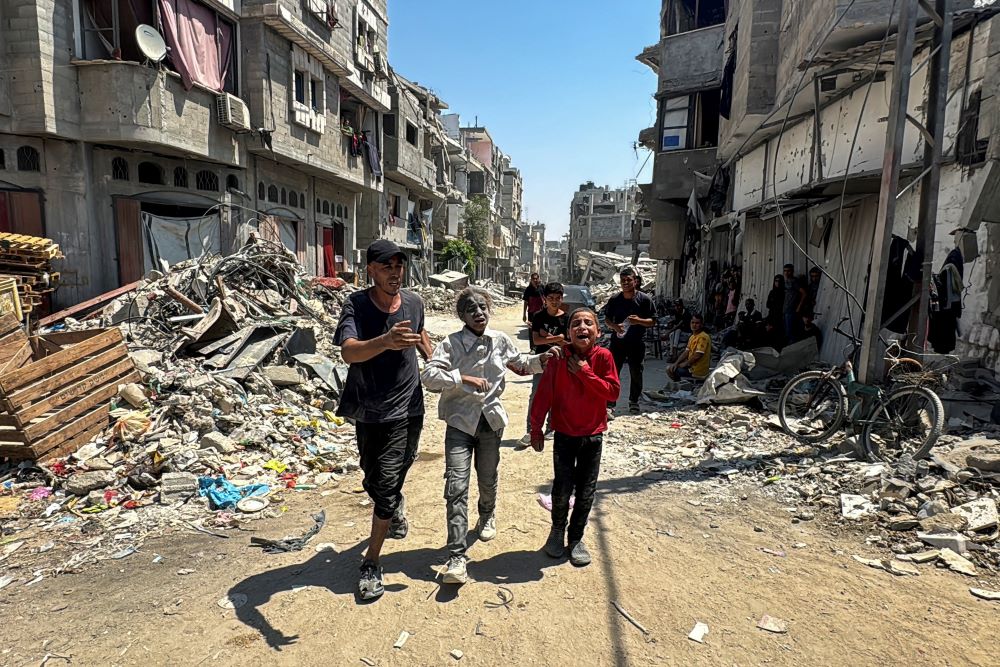
A humanitarian aid worker unloads mattresses supplied by Catholic Relief Services in Rafah in the southern Gaza Strip March 21. They were distributed to people displaced in war-torn Gaza. An estimated 41,000 Gazans have died since Israel responded to Hamas' Oct. 7 attack. (OSV News/Mohammad Al Hout for CRS)
In recent weeks the international community has shifted its focus from the besieged Gaza Strip to Israeli's escalating attacks against Hezbollah targets in Lebanon.
A Hamas ally, the militant group Hezbollah began striking Israel with rockets after the war in Gaza began, and on Sept. 23 and 24, the Israeli military bombarded Lebanon — from which Hezbollah operates — with airstrikes that killed about 570 people, including 50 children, and injured more than 1,800.
But as global attention is diverted northward, the conflict in the Gaza Strip approaches the one-year mark with ongoing suffering for Palestinian civilians, who continue to lack critical humanitarian aid and in the final weeks of September faced ongoing violence, displacement and disease. With winter looming, the population is braced for the rainy season.
There is "a deep emotional exhaustion," said Jason Knapp, country representative for Catholic Relief Services in Jerusalem, the West Bank and Gaza, reflecting on the past 12 months. Even so, Knapp said he's been deeply moved by the Palestinians' ability to "carry on and cope with immeasurable difficulty" and by CRS staff, "who put their lives on the line on a regular basis."
'It's hard to imagine it's been one year, and that reality should redouble our efforts to seek a peaceful future.'
—Jason Knapp
On Oct. 7, 2023, the militant group Hamas attacked Israel, killing about 1,200 people and seizing more than 250 hostages. The Gaza Health Ministry says Israel's subsequent military response has led to 41,000 Palestinians deaths — meaning 1 in 51 people within the coastal enclave has been killed. More than 15,000 children are estimated dead and thousands are missing, according to the humanitarian aid group Save the Children.
CRS is a global humanitarian aid organization founded during World War II by the U.S. Conference of Catholic Bishops. It currently has staff members in all parts of Gaza not under an evacuation notice, said Knapp, speaking to NCR from Jerusalem. In the past few months, the agency hired about 20 additional people to meet the region's dire needs, bringing the total to 85 staff members, most of whom are Palestinian, and 150 partner staff.
The nonprofit's aid for northern Gaza enters primarily through the Israel-Jordan border. Getting supplies to the southern region via the Kerem Shalom crossing remains "extremely challenging" following the Israeli military's ground offensive into Rafah in May, Knapp said. In the wake of the attacks, the city was described as "a wasteland."
Unable to get substantial supplies into the south, CRS works with partner organizations to supply food in that region and also offers cash vouchers, psychosocial programming, and water and sanitation support. It's "assistance we are able to procure locally inside Gaza," Knapp said. "But large quantities of goods that come from other countries have been constrained."

A Catholic Relief Services worker distributes shelter material to a woman in Rafah in the southern Gaza Strip March 21. The woman was displaced by the ongoing conflict between Israel and Hamas. (OSV News/Mohammad Al Hout for CRS)
In spite of the challenges, CRS has aided nearly 1 million people in Gaza. Along with food, it distributes tents and tarps, bedding, and pots and pans. Staff are trying to expand their sanitation efforts and provide household latrines, and hygiene and cleaning supplies.
CRS also is attempting to increase its psychosocial support for children and adolescents. Knapp said programs are semi-structured and give young people a chance to enjoy positive activities and social interactions but also process what they are experiencing and learn "to cope with the situation as best they can."
The United Nations and humanitarian groups say the persistent shortage of aid in the region is due to Israel's ongoing military activities, looting and lawlessness, and a complex administrative process required for aid distribution. A coalition of aid organizations working in Gaza published a report Sept. 16 that states Israel has "systematically blocked" food, medical supplies and tents from entering the strip.
Knapp said a family member of a CRS staffer recently died because he had a long-term health condition and had not been able to receive appropriate care since the war began.
"It is so clear that this war needs to end and that it has caused the immeasurable suffering of civilians," said Knapp. "And it's also clear that we need to get much more assistance really, really quickly, especially in the south half of Gaza, as we are looking ahead to winter and the increased level of vulnerability people are facing."
After a baby was partially paralyzed by polio, a U.N.-led effort successfully vaccinated about 90% of children in Gaza this summer. The U.N. warned in mid-September, however, that sanitation conditions were "worsening by the day," and Knapp said rains, already flooding low-lying and sandy locations, exacerbate the problem.
Aid workers, too, experience the harsh realities of the conflict alongside people they are trying to help. According to the U.N., more than 280 aid workers have been killed in Gaza since October 2023 — the same number killed worldwide in 2023.
Several CRS staff have been injured, but "but thank God we've not lost anyone," Knapp told NCR. Nevertheless, CRS staff witness violent incidents daily, he said. A few weeks ago, a staffer's tent was across the street from an Israeli target.
"Shrapnel ripped through the tent," Knapp said. "And this was in an area where civilians were told they were allowed to be."
Military action, along with displacement, "impacts civilians dramatically," he said. "People are needing to restart life again and again in different locations." About 90% of the population is homeless.
The emotional exhaustion Knapp said he's witnessed is particularly acute among the elderly, those with medical conditions, families with young children and nursing mothers.

Palestinians react at the site of an Israeli strike that destroyed several houses, amid Israel-Hamas conflict, in Khan Younis in the southern Gaza Strip Aug. 27. (OSV News/Reuters/Mohammed Salem)
Knapp told NCR he believes the United States has been "working very hard" to help negotiate a cease-fire. "But what I've also been asking them is this: In the meantime, what else can we change in the operating environment to make sure that we're able to scale assistance dramatically and to make sure that aid workers are able to operate safely?"
U.S. officials had in recent months expressed optimism that a cease-fire deal between Hamas and Israel was close, but talks were at an impasse even before the explosion of violence in Lebanon.
The United States remains the largest supplier of weapons to Israel, accounting for nearly 70% of the country's arms imports, according to the Stockholm International Peace Research Institute. In May, concerned about Israel's ground offensive on the city of Rafah, the United States halted weapon shipments. It later reauthorized the delivery of 500-pound bombs while withholding those that are 2,000 pounds.
Advertisement
Members of the Catholic community have a particularly important role to make their voices heard and to be prophetic, said Knapp. "It's hard to imagine it's been one year, and that reality should redouble our efforts to seek a peaceful future."
Knapp said he wanted to acknowledge and celebrate the CRS workers who are risking their lives to help. He recalled one staff member who's been offering aid in the region since the start of the conflict and was displaced once again a few weeks ago.
"For him to go through that experience with his family, to live with that level of uncertainty and confusion and then come to work the next day and help others get the food that they need to survive, to live; it is remarkable," said Knapp.
At the same time, "there are also many, many stories of heartache — of the people who are dear to them who don't have what they need and who were killed," he said. "So many people are saying, 'Please, let this end.'
"We hope," said Knapp, "this message continues to reach those in power."








